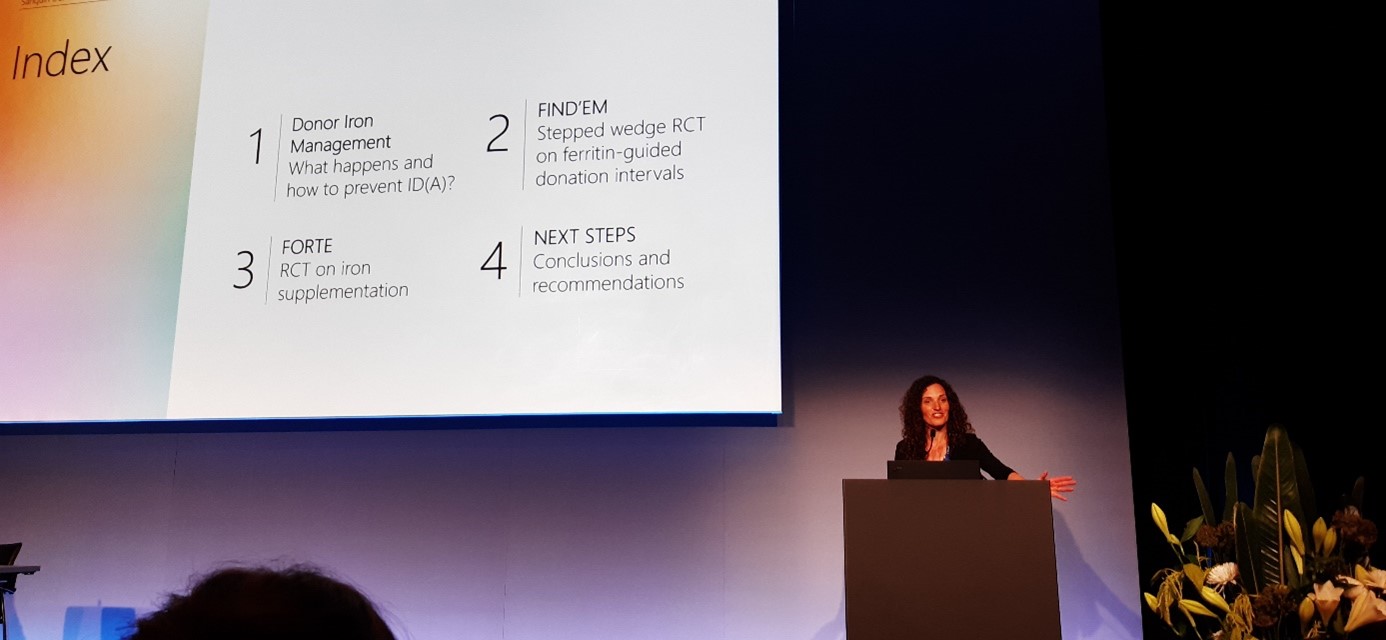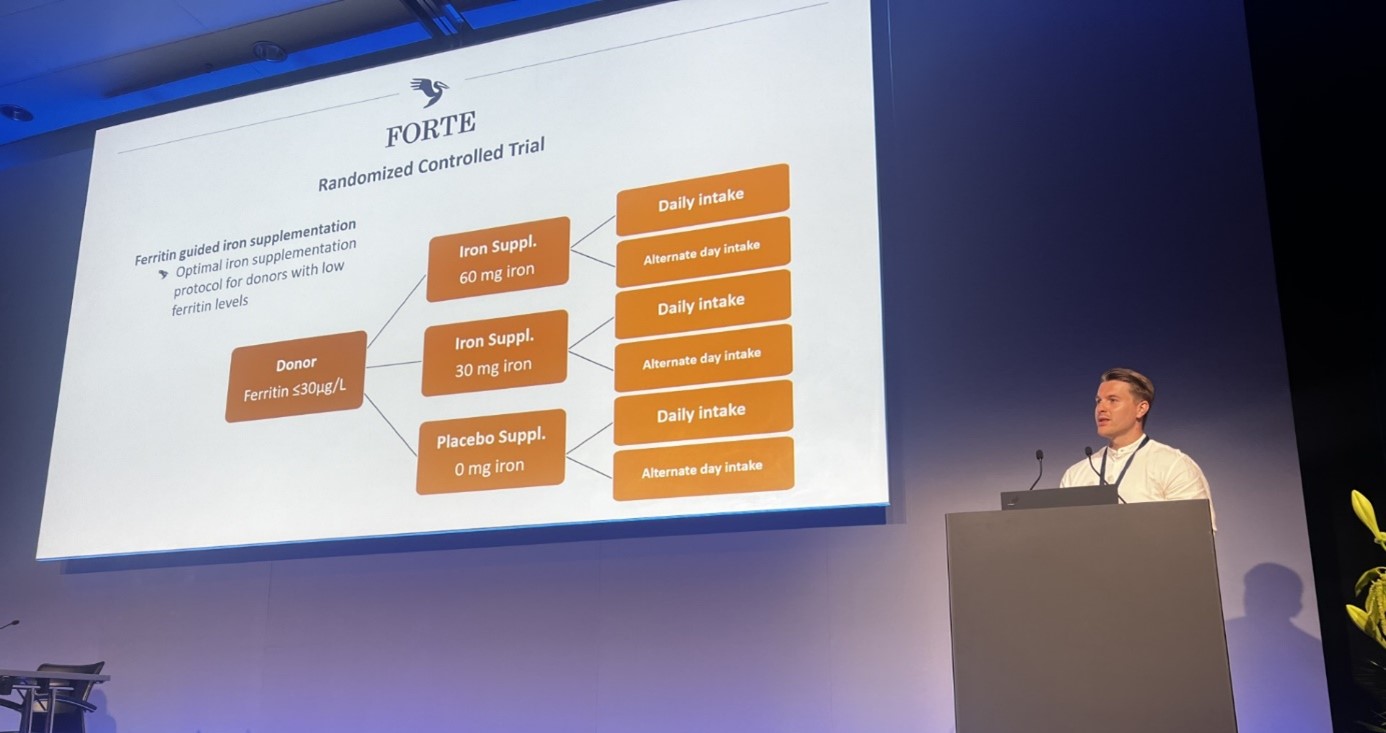Sanquin shines at the ISBT conference in Barcelona
NewsFrom June 23 to 27, the 34th regional congress of the International Society for Blood Transfusion (ISBT) took place in Barcelona, Spain, with strong representation from the Donor Health, Donor Behaviour & TTA research groups. Below are the posters, presentations, and workshop organized during the 34th ISBT.
Next to the presentations we enjoyed the scenery of Barcelona during the ISBT Fun Run, networking opportunities, and of course the congress party. It was great to see the high attendance and large Sanquin contribution to this ISBT event!
Presentations were given by Katja van den Hurk, Mart Janssen, Eva-Maria Merz, Jan Karregat, Amber Meulenbeld, and Alexandra Ciausescu.
Presentations
Eva-Maria Merz
For the first time at ISBT 2024, Eva-Maria Merz organized a workshop “The social science of transfusion medicine”, led by dr. Kelly Holloway from the Canadian Blood Service. The workshop introduced social science theories and methods used in donation studies. It included four panels featuring leading scholars in the field:
- Foundational Insights: Introduction and lessons from social science research in transfusion medicine
- Broadening the scope: Innovative approaches and methodologies for social science research in transfusion medicine
- Multidisciplinary collaborations: When social science and lab science meet in transfusion medicine
- From insight to impact: Overcoming knowledge translation challenges for social science in the blood service
The workshop was very well attended (more than 100 participants), indicating a broad interest in these topics. Lively and interactive discussions demonstrated the relevance of the field for blood services internationally.
At the Academy Day, Eva-Maria had the pleasure to present some of her research on social media and its role in blood donation behaviour. Social media can be used as a tool and resource for understanding, explaining, predicting, and influencing donor behaviour. To make optimal use of social media for information, recruitment and retention campaigns, blood collection agencies should recognize the turbulent and dynamic environment of social media. Monitoring public opinions about blood donation can help blood collection agencies make strategic choices and utilize social media more effectively. Engaging with (potential donors) through social media channels can impact donor attitudes, stimulate donation, and contribute to the reputation of blood banks.
Mart Janssen
On the second day of the conference, Academy Day, Mart Janssen was allowed to speak for half an hour in the morning about why, in his opinion, on-site donor Hb deferral is generally unnecessary. This is a story that Mart has been trying to convince people of for several years now which is based on a statistical analysis of the Hb measured in millions of consecutive blood donations. Hence the title “Towards a data-driven donor-deferral policy: Improving donor health and eradicating unnecessary on-site low-Hb deferrals globally”. Not only can a different way of interpreting Hb values lead to a substantial reduction of on-site donor deferrals, but an integral consideration of a donor's Hb history also allows an improved regulation of the recovery of donors' iron stores.
Katja van den Hurk
Katja opened the ‘Donor Health – staying magnetic’ session on Wednesday, in which iron research from all over the world was presented. She started with an overview of the iron related research conducted at Sanquin. In her talk, she further discussed the results of the FIND’EM and FORTE trials, about extended donation intervals and iron supplementation as policies to reduce Hb deferrals and iron deficiency and improve donor health.

Jan Karregat
In the same session, Jan presented the results of the FORTE trial in further detail. We know that iron supplementation may be an alternative or additional strategy to extended donation intervals, but the optimal dose and intake frequency of the supplements are unknown. In the FORTE trial, we assessed the effectiveness of iron supplementation on post-donation iron recovery by evaluating the impact of four different iron supplementation protocols, compared to placebo supplementation. In the trial, we found that iron supplementation effectively improved iron store recovery in whole blood donors with low ferritin. The effects are dose and frequency dependent, with a higher dose and frequency leading to faster recovery.

Amber Meulenbeld
Following Katja and Jan’s talks, Amber presented in the same session on a new definition of iron deficiency. The WHO’s definition of iron deficiency is a ferritin level below 15 ng/mL, but there is little evidence for this threshold. Using a new methodology, we estimated the ferritin threshold in five different countries. We found that there is a distinct ferritin level below which the Hb of a donor starts decreasing, compared to their personal baseline Hb. In her talk, Amber advocated for more standardization in ferritin measurements, as it’s difficult to compare the results between countries because of the different measurement methods.
Alexandra Ciausescu
Alexandra Ciausescu presented during the Plasma Donor Session on the serious game (a type of video game) she developed together with Eva-Maria Merz, Arjen de With, and Rene Bekkers. This game has been shown to be effective in increasing knowledge about plasma and plasma donation among children and adolescents. She discussed how the game was tested at the science museum NEMO and shared the children's experiences while playing it. You can play the online version of the game here. Alexandra had additionally a poster presentation where she shared findings from her latest research projects on how blood banks in Europe use social media to reach both donors and non-donors. With the help of two interns at Sanquin, Jamie de Jong and Lisanne Jansen, she conducted 22 interviews last year with communication and marketing specialists from blood banks across Europe exploring the objectives, strategies, and future trends in social media use by these institutions.
Other posters were presented by Amber Meulenbeld, Sophie Wehrens, Femmeke Prinsze, and Franke Quee.
